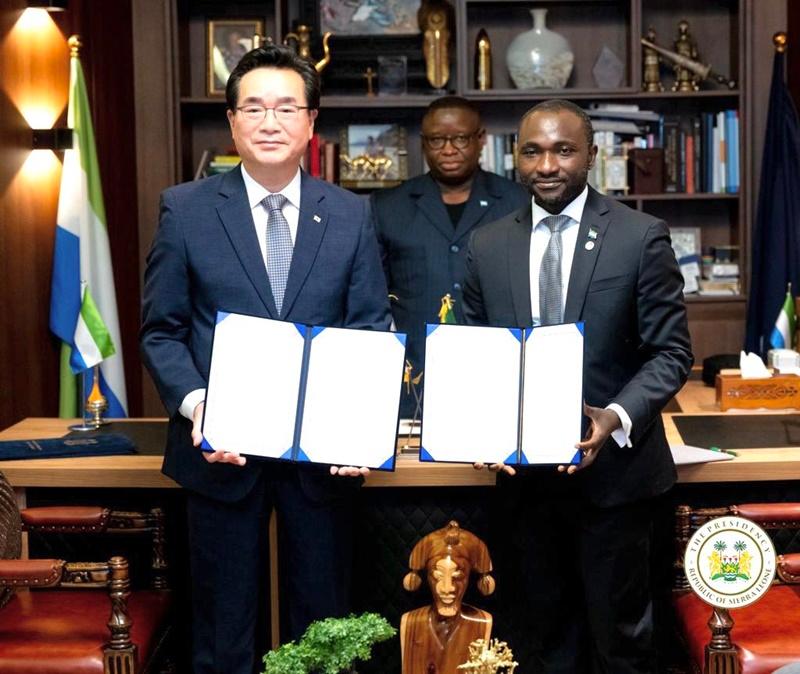
Minister of Agriculture, Food and Rural Affairs Chung Hwang-keun (left) and Sierra Leonean Minister of Agriculture and Food Security Henry Kpaka on Oct. 16 hold each side's copy of a memorandum of understanding on the K-Ricebelt Project at the signing ceremony hosted by the African country's presidential residence State House in Freetown. (Ministry of Agriculture, Food and Rural Affairs)
By Choi Jin-woo
Sierra Leone is the ninth member country of Korea's K-Ricebelt Project, which provides high quality rice varieties and shares Korean farming know-how to ensure sustainable food security.
The Ministry of Agriculture, Food and Rural Affairs in Seoul on Oct. 17 said its Minister Chung Hwang-keun, who visited the West African country as a special presidential envoy, made Sierra Leone's entry in the project official the day before after holding talks with Sierra Leonean President Julius Maada Bio, Minister of Foreign Affairs and International Cooperation Timothy Kabba and Minister of Agriculture and Food Security Henry Kpaka.
The K-Ricebelt Project is a form of large-scale official development assistance in agriculture to back the improvement of sustainable rice productivity through the distribution of Korean-developed rice types, transfer of agricultural technology and construction of infrastructure to resolve food shortages in Africa.
Seoul has signed memorandums of understanding (MOU) with eight African states -- Ghana, Gambia, Guinea, Guinea Bissau, Senegal, Uganda, Cameroon and Kenya -- since officially launching the project in July.
President Bio at the talks said his country hopes to receive Korea's outstanding rice strains and development experience in agricultural technology, adding that his country was looking for a friend like Korea.
Ministers Chung and Kpaka also signed an MOU on cooperation in the project to raise Sierra Leon's productivity in rice output.
"With a focus on agriculture, Korea will cooperate with Sierra Leone in various areas like technology and human exchange," Minister Chung said, and requested the African country's support for Busan's bid to host the 2030 World Expo.
In his discussion with Minister Kabba, Minister Chung said Seoul and Freetown from next year will cooperate in responses to international crises as non-permanent members of the United Nations Security Council. The latter also delivered donated items from Korea such as computers to Sierra Leone's Foreign Service Academy.
"Sierra Leone shares a similar past with Korea in seeking self-sufficiency in food while rebuilding a country that was ravaged by civil war," the Korean diplomat said. "With Sierra Leone as the ninth member country of the K-Ricebelt Project, we will raise the global status of Korean agriculture by strongly setting the basis for agricultural cooperation focused on rice."
paramt@korea.kr